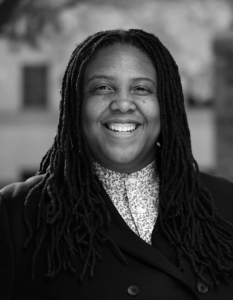Understanding the mentoring experiences of Black women and girls

WORKSHOP LED BY TORIE WEISTON-SERDAN
Torie Weiston-Serdan is a mentoring scholar and practitioner with over fifteen years of teaching and youth programming experience. She is the co-founder and Executive Director of the Youth Mentoring Action Network, a southern California based non-profit working to leverage mentoring in the fight for equity and justice. In 2007, Torie wrote Critical Mentoring: A Practical Guide, which has become a seminal text in the youth mentoring and educations fields. She does extensive work with community-based and philanthropic organizations in support of their youth advocacy efforts, specializing in training mentors to work with diverse youth populations and serves on the Big Brothers Big Sisters LGBTQ National Advisory Board. Torie has given several talks on education and mentoring, including a 2018 TedTalk on critical mentoring. She also directs the Community Engaged Education and Social Change masters program at Claremont Graduate University where she is focused on training the next generation of non-profit and philanthropic professionals.
ABSTRACT
What does mentoring practice look like for Black women and girls?
In what ways does mentoring impact Black girls?
This compelling workshop will utilize images, video, narrative, and discussion to share essential themes, findings, and conclusions from the research project.
The goal of the session will be to share essential findings from a year of research as well as to help the audience understand how to be more effective mentors for Black women and girls and layout suggestions for the global implications of this research.
Youth mentoring research has been a monolith; focusing primarily on data sets from formalized programs and by proxy, the young people attracted to those programs. The knowledge about mentoring, how it works, who it works for and why it works, stems from these foundational studies. As a result, the field has been guided by standards and curriculum and limited in scope and ability to serve diverse and marginalized youth populations. Black and Afro-Latina researchers have highlighted the importance of naturally occurring and informal mentoring among youth of color (Sanchez, Esparza, & Colon, 2008; Hurd & Zimmerman, 2010; Hurd, Sanchez, Zimmerman & Caldwell, 2012). As more attention is paid to issues of equity, mentoring and the researchers who study it, require a more nuanced understanding of what mentoring is and how it operates in the lives of different groups of people. Currently, the most viable framework for culturally relevant mentoring is a concept called critical mentoring (Weiston, 2017). Critical mentoring focuses on using essential components of critical theories, particularly CRT, to inform crucial elements of mentoring. Beginning with a critical understanding of context and then using components of CRT to inform mentoring activities.
Utilizing Black feminist thought and Black feminism in qualitative research, the researcher collected the stories and experiences of Black women and girls, from their own accounts, in an effort to understand what mentoring is to them and how it has impacted their lives. Black feminist thought emphasizes the importance of Black women and girls being independent knowledge constructors, purveyors of their own truths and understandings (Hill-Collins, 1989). To that end, this project positioned Black women and girls as experts in their own work and sought to grasp their knowledge about the inner workings of mentoring and its impact on their lives. In addition, Evans-Winter’s work on Black Feminism in Qualitative Inquiry illustrates the importance of disrupting the “linear” ways in which qualitative research is done and shared and focuses on centering the voices and lived experiences of Black women and girls and in ways that make sense of Black women and girls (Evans-Winters, 2019). In an effort to disrupt the euro-centric approach to mentoring and conducting research on mentoring, this project utilized these frameworks to create a space for a Black women researcher to study Black women and girls in a way that centers all of our knowledge, processes, and stories around mentoring relationships.
